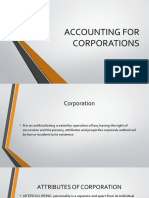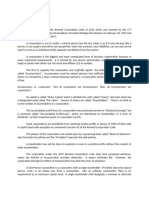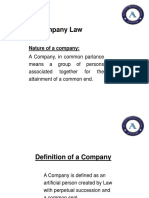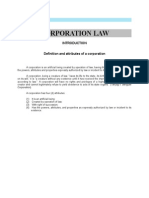0 ratings0% found this document useful (0 votes)
2 viewsBusiness Law Final
Business Law Final
Uploaded by
rheamaelazarte27Copyright:
© All Rights Reserved
Available Formats
Download as DOCX, PDF, TXT or read online from Scribd
Business Law Final
Business Law Final
Uploaded by
rheamaelazarte270 ratings0% found this document useful (0 votes)
2 views4 pagesOriginal Title
BUSINESS LAW FINAL
Copyright
© © All Rights Reserved
Available Formats
DOCX, PDF, TXT or read online from Scribd
Share this document
Did you find this document useful?
Is this content inappropriate?
Copyright:
© All Rights Reserved
Available Formats
Download as DOCX, PDF, TXT or read online from Scribd
Download as docx, pdf, or txt
0 ratings0% found this document useful (0 votes)
2 views4 pagesBusiness Law Final
Business Law Final
Uploaded by
rheamaelazarte27Copyright:
© All Rights Reserved
Available Formats
Download as DOCX, PDF, TXT or read online from Scribd
Download as docx, pdf, or txt
You are on page 1of 4
BUSINESS LAW
Definition of a Close Corporation
A close corporation is a business organization which all shares are held by a few selected persons who
are either related by blood or marriage, or those who know each other well and are aware of each
other’s business skills.
Close Corporation Regular Corporation
There can be classification of There are no classifications of
directors into one or more classes board of directors
Articles of Incorporation may Only to board of directors exercise
provide that corporate powers corporate powers
may be exercised by stockholders
Stockholders are subject to Stockholder are not subject to
liabilities of directors liabilities
Articles of Incorporation may give Powers to appoint corporate
powers to stockholders to appoint officers are exercised by the Board
corporate officers of directors
Articles of Incorporation may Fixed by the corporation code
provide for greater voting quorum
Preemptive right extends to Pre-emptive rights does not
treasury shares extend to treasury shares
Stockholder may compel the Shareholders may not compel the
corporation to purchase his shares corporation except in right of
appraisal
Deadlocks in Management
Deadlock is a situation in which the directors or stockholders of a close corporation are so divided with
regard to the management of corporate affairs and the votes required for any corporate action cannot
be obtained with the consequence that the business affairs of the corporation can no longer be
conducted to the advantage of the stockholders.
Dissolution of a Close Corporation
Upon written petition to SEC, stockholder may compel the dissolution of the corporation whenever any
of the acts of the directors, officers or those in control of the corporation is illegal, or fraudulent, or
dishonest
Definition of a Foreign Corporation
A foreign corporation is a company formed, organized or existing under any law other than those of the
Philippines, and whose laws allow Filipino citizens and corporations to do business in its own country or
state
Under the Foreign Investment act of 1991, doing business covers
• Soliciting orders
• Service contracts
• Opening offices
• Appointing representatives
Suability of Foreign Corporations
1. Foreign corporations doing business in the Philippines;
• With license: may sue and be sued in the Philippines;
• Without license: cannot sue but may be sued in the Philippines. (Sec. 133)
2. Foreign corporation not doing business in the Philippines: on isolated transaction, it may sue and be
sued.
Documentary requirements:
1. Application, under oath, filed in SEC including Articles of Incorporation and by-laws;
2. Attach certificate that the laws of their incorporation allows Filipino citizens and corporation to
business in their country and that the corporation is in good standing;
3. Certification that the corporation is solvent and in sound financial condition; and
4. Other requirements as provided for by laws and authority from appropriate authority
Merger or Consolidation Involving a Foreign Corporation
One or more foreign corporations authorized to transact business in the Philippines may merge or
consolidate with any domestic corporation or corporations if such is permitted under Philippine laws
and by the law of its incorporation and the requirements on merger or consolidation as provided in
corporation code are followed.
Revocation of License
• Failure to file its annual report or pay any fees;
• Failure to appoint and maintain a resident agent in the Philippines;
• Failure to pay any and all taxes, imposts, assessments or penalties;
• Failure to submit to the SEC an authenticated copy of any amendment to its articles of
incorporation or by-laws or of any articles of merger or consolidation;
Withdrawal by a Foreign Corporation
If a foreign corporation duly licensed to do business desires to withdraw, it must file a petition for
withdrawal, and must meet the following requirements:
• All claims accrued in the Philippines must be settled;
• All taxes must be paid; and
• Petition must be published once a week for three (3) consecutive weeks (Sec. 136)
Educational Corporation
An educational corporation is a stock or non-stock corporation organized to provide facilities for
teaching or instruction. Such corporation normally maintains a regular faculty and curriculum and
normally has a regular organized body of pupils or students,
Religious Corporations
A religious has been defined as a corporation composed entirely or spiritual persons and which is
erected for the furtherance of a religion or for perpetuating the rights of the church or of the
administration of church or religious work or property.
A corporation sole its purpose is to administer and manage as trustee the property and affairs of such
religious sect, denomination or church, within the territorial jurisdiction of such office.
Definition of a Non-stock Corporation
A non-stock corporation is an organization that does not have a capital stock. Thus, no part of its
income is distributable as dividends to its members, trustees, or officers.
Comparison of non-stock and stock
Stock corporations are formed to generate profit for stockholders. Non-profit corporations are formed
for reasons other than profit.
Profits are declared and distributed to stockholders in stock corporations. Non-stock corporations, on
the other hand, do not distribute their profits and instead use them to further their own goals.
Non-stock corporations are made up of members rather than stockholders (also known as shareholders
or share owners). A stock corporation is governed by a board of directors (BOD), whereas a non-stock
corporation is governed by a board of trustees (BOT).
Purpose of a Non-stock Corporation
Non-stock corporations are business organizations which may be organized for charitable, religious,
educational, professional, cultural, fraternal, literary, scientific, social, civic service or similar purpose
like trade, industry, agriculture, and like chambers or any combination thereof
Conversion from Non-Stock to Stock Corporation
A non-stock corporation cannot be converted into a stock corporation by mere amendment of the
articles of incorporation. It can only be dissolved under Sec. 177 to 122 of the Corporation Code.On the
contrary, stock corporations can be converted to non-stock corporations by amending its Articles of
Incorporation.
Trustees and Officers
• A non-stock corporation may designate their governing board by any name other than board of
trustees. (Sec. 138);
• Numbers of trustees may be more than 15 as fixed by Articles of Incorporation (Sec. 92) but
their incorporating trustees may not be more than 15 (Sec. 15);
• The term of the first trustees is staggered, Sec. 24 and 29 should also be followed; and
• Term of officer is three years except the first directors (
Concept of Dissolution
Dissolution of corporation is the termination of its existence. It may be voluntary or involuntary
Voluntary Dissolution
a. Voluntary Dissolution where no creditors are affected (Sec. 118)
b. Voluntary Dissolution where creditors are affected (Sec. 119)
c. Amending the articles of incorporation to shorten corporate term (Sec. 120)
d. In case of a corporation sole, by submitting to the SEC a verified declaration of dissolution
Involuntary Dissolution
a. By the expiration of the term provided in the articles of incorporation (Sec. 11)
b. By its failure to formally organize and commence the transactions of its business or construction
of its works within two years from its incorporation (Sec. 22)
c. By order of the securities and exchange commission (Sec. 121)
d. By legislative dissolution (Sec. 145)
Corporate Liquidation
Liquidation is the winding up of the affairs of a corporation by converting assets and property to cash, A
liquidation proceeding is a proceeding in rem so that all other interested persons whether known to the
parties or not may be bound by such proceedings
The Concept of Merger and Consolidation
Two or more existing corporations may combine into a single corporation. There are situations where
one of the constituent corporations remain to exist and there situations where they form a new single
corporation which shall be the consolidated corporation
You might also like
- Business Associations Outline + ChecklistDocument44 pagesBusiness Associations Outline + ChecklistCAlawoutlines100% (27)
- Notes On The Corporation Code of The PhilippinesDocument23 pagesNotes On The Corporation Code of The Philippinescristiepearl100% (9)
- DOA Agreement 100MDocument13 pagesDOA Agreement 100MJalal Khan100% (1)
- As 2545-1993 (Reference Use Only) Subcontract ConditionsDocument7 pagesAs 2545-1993 (Reference Use Only) Subcontract ConditionsSAI Global - APAC0% (1)
- Lecture Notes - Company AccountsDocument5 pagesLecture Notes - Company AccountsFredhope Mtonga75% (4)
- ANSYS Fluent Meshing TutorialsDocument6 pagesANSYS Fluent Meshing TutorialsAnonymous dtGbWV100% (1)
- Tender of Payment Laws Here in Georgia, GREATDocument3 pagesTender of Payment Laws Here in Georgia, GREATDavid Jeremiah II95% (21)
- Sample of Export ContractDocument4 pagesSample of Export Contractfidoborder100% (1)
- Accounting For Corporations NEW 1Document27 pagesAccounting For Corporations NEW 1Mark RevarezNo ratings yet
- ACCOUNTING FOR CORPORATIONS-Basic ConsiderationsDocument41 pagesACCOUNTING FOR CORPORATIONS-Basic ConsiderationsMarriel Fate Cullano100% (3)
- Piercing The VeilDocument13 pagesPiercing The VeilVinDiesel Balag-eyNo ratings yet
- Corpo NotesDocument23 pagesCorpo NotesJerome DinNo ratings yet
- CorporationDocument9 pagesCorporationhwhwhwhjiiiNo ratings yet
- Accounting For CorporationsDocument24 pagesAccounting For Corporationsroselynm18100% (1)
- Accounting For Corporation TopicsDocument8 pagesAccounting For Corporation Topicsjnh62wv8zfNo ratings yet
- RCC Title IV-XVIIDocument27 pagesRCC Title IV-XVIIpenas.elizabethNo ratings yet
- Law On Busines OrgDocument5 pagesLaw On Busines OrgSheena CariñoNo ratings yet
- De Leon, Corpo Law MTDocument3 pagesDe Leon, Corpo Law MTRyannDeLeonNo ratings yet
- Corporation 1Document26 pagesCorporation 1Erica Faye AsaNo ratings yet
- Revised Corporation Code of The PhilippinesDocument3 pagesRevised Corporation Code of The PhilippinesjenneaalegaNo ratings yet
- Accounting For Corporation For LMSDocument77 pagesAccounting For Corporation For LMSRosethel Grace Gallardo100% (3)
- Company Law - NewDocument137 pagesCompany Law - NewEbinAbrNo ratings yet
- Kinds of CompaniesDocument7 pagesKinds of CompaniesAt JainNo ratings yet
- 6. Company LawDocument12 pages6. Company Lawll3607870No ratings yet
- BE Week 4Document42 pagesBE Week 4nikhilkhemka123No ratings yet
- Companies Act, 1956Document42 pagesCompanies Act, 1956maitrishahNo ratings yet
- Corporation Law NotesDocument10 pagesCorporation Law NotesFrances Angelie NacepoNo ratings yet
- B Company LAW - StudentDocument61 pagesB Company LAW - StudentSudipta SarangiNo ratings yet
- Company Law: Nature of A CompanyDocument151 pagesCompany Law: Nature of A Companychangumangu100% (1)
- EquityDocument19 pagesEquityMary Grace AliguaNo ratings yet
- Unit 3 - Companies Act 1. Define CompanyDocument17 pagesUnit 3 - Companies Act 1. Define CompanyDr. S. PRIYA DURGA MBA-STAFFNo ratings yet
- CorporationDocument7 pagesCorporationDo RaemondNo ratings yet
- Corporation: Advantages DisadvantagesDocument27 pagesCorporation: Advantages DisadvantagesRoy Kenneth LingatNo ratings yet
- Topic 2 Formation of CompaniesDocument19 pagesTopic 2 Formation of CompaniesnandhamishaNo ratings yet
- Module 1 Shareholders EquityDocument38 pagesModule 1 Shareholders Equitymarvy AndayaNo ratings yet
- Meaning & Formation of CompanyDocument21 pagesMeaning & Formation of Companysmsmba67% (3)
- AE100 FAR: Corporation Accounting: Basic ConsiderationsDocument23 pagesAE100 FAR: Corporation Accounting: Basic Considerationsdiane pandoyosNo ratings yet
- Commercial Law Bar Syllabus with AnswersDocument9 pagesCommercial Law Bar Syllabus with AnswersDennis Jay ParasNo ratings yet
- Memorandum of Association PresentationDocument62 pagesMemorandum of Association PresentationUsman Syed100% (1)
- Corporation Part 1Document20 pagesCorporation Part 1ALLYSSA GABRIZANo ratings yet
- VernanceDocument10 pagesVernancejyothikajose24No ratings yet
- Corporation Law AngelfireDocument137 pagesCorporation Law Angelfire'Bernan Esguerra BumatayNo ratings yet
- BL 2023 SolDocument6 pagesBL 2023 SoltechworkpressNo ratings yet
- Company Law EntrepreneurshipDocument49 pagesCompany Law Entrepreneurshipxvqvq86myjNo ratings yet
- Learning Module InformationDocument40 pagesLearning Module InformationJamila MendozaNo ratings yet
- Question Bank Answer: UNIT 4: Company FormationDocument5 pagesQuestion Bank Answer: UNIT 4: Company Formationameyk89No ratings yet
- Law of PersonsDocument19 pagesLaw of Personsmohamedmwakuzimu9966No ratings yet
- Corpo Handout AccontingDocument13 pagesCorpo Handout Accontingsilvajustin37No ratings yet
- 5-Directors of A CoDocument15 pages5-Directors of A CoKamuzu GondweNo ratings yet
- Corpo NotesDocument140 pagesCorpo NotesYeale F. RuizNo ratings yet
- Corporation AccountingDocument15 pagesCorporation Accountingcaleblauredo100% (1)
- Unit - 2: Corporate Incorporation and ManagementDocument74 pagesUnit - 2: Corporate Incorporation and Managementpavan kumarNo ratings yet
- Rowshonara Akter Akhi Lecturer Department of Finance & Banking Jahangirnagar UniversityDocument28 pagesRowshonara Akter Akhi Lecturer Department of Finance & Banking Jahangirnagar UniversityRubayet HasanNo ratings yet
- Corporation Law NotesDocument6 pagesCorporation Law NotesFrances Angelie NacepoNo ratings yet
- Corporation+Hand+Out Revised+2022Document11 pagesCorporation+Hand+Out Revised+2022hzbnzbajavxhsNo ratings yet
- MBA Notes - Company LawDocument9 pagesMBA Notes - Company LawAnonymous uxd1yd100% (2)
- Belab-Unit 4Document54 pagesBelab-Unit 4varshneypalak0No ratings yet
- Company Law PPT by SaikatDocument26 pagesCompany Law PPT by Saikatsaikat_1986No ratings yet
- COMPANY LAW (Companies Act, 1956) : Rakesh Singamsetti 09102008Document39 pagesCOMPANY LAW (Companies Act, 1956) : Rakesh Singamsetti 09102008Spandana Alapati0% (1)
- Corporation ReviewerDocument8 pagesCorporation RevieweryelzNo ratings yet
- Legal Aspects - Unit-2Document33 pagesLegal Aspects - Unit-2Vikram VikasNo ratings yet
- 1 Corporation Accounting IntroductionDocument6 pages1 Corporation Accounting IntroductionShane Ivory ClaudioNo ratings yet
- Company Law NotesDocument6 pagesCompany Law NotesAAQIB SAFWAN HNo ratings yet
- Textbook of Urgent Care Management: Chapter 6, Business Formation and Entity StructuringFrom EverandTextbook of Urgent Care Management: Chapter 6, Business Formation and Entity StructuringNo ratings yet
- Service Agreement and Statement of WorkDocument5 pagesService Agreement and Statement of WorkZahra CruzNo ratings yet
- Article 1767-1768Document13 pagesArticle 1767-1768janeNo ratings yet
- Land Bank of The Philippines VS OngDocument13 pagesLand Bank of The Philippines VS Ongjojo50166No ratings yet
- The Limited Liability CompanyDocument11 pagesThe Limited Liability CompanyMikhaela Divine GarciaNo ratings yet
- Assets & Liabilites Statement - BorrowerDocument2 pagesAssets & Liabilites Statement - BorrowerAzril JinumboNo ratings yet
- Gil v. MurcianoDocument6 pagesGil v. MurcianoNicole KalingkingNo ratings yet
- Acebedo Vs AbesamisDocument6 pagesAcebedo Vs AbesamisI took her to my penthouse and i freaked itNo ratings yet
- Hadley v. BaxendaleDocument7 pagesHadley v. BaxendaleJulia HutchinsNo ratings yet
- Organization and Management: The Firm and It's EnvironmentDocument9 pagesOrganization and Management: The Firm and It's EnvironmentMegan Lou CamiguinNo ratings yet
- SSS v. de Los SantosDocument3 pagesSSS v. de Los SantosespressoblueNo ratings yet
- 60 STATE INVESTMENT HOUSE INC Vs CITIBANKDocument2 pages60 STATE INVESTMENT HOUSE INC Vs CITIBANKMilcah MagpantayNo ratings yet
- CivPro - Provisional Remedies TableDocument12 pagesCivPro - Provisional Remedies TableMaria Analyn100% (1)
- First Security Bank of Idaho v. Fred Crouse, D/B/A C & L Diesel Service, 374 F.2d 17, 1st Cir. (1967)Document4 pagesFirst Security Bank of Idaho v. Fred Crouse, D/B/A C & L Diesel Service, 374 F.2d 17, 1st Cir. (1967)Scribd Government DocsNo ratings yet
- Test - Chapter 1Document3 pagesTest - Chapter 1KingNo ratings yet
- Mutual Confidentiality and Non-Disclosure Agreement: TH THDocument8 pagesMutual Confidentiality and Non-Disclosure Agreement: TH THrajatkumar.codingNo ratings yet
- Sps. Salvador v. Sps. Rabaja, G.R. No. 199990, February 04, 2015Document7 pagesSps. Salvador v. Sps. Rabaja, G.R. No. 199990, February 04, 2015Nalupa Jemma LynNo ratings yet
- Checklistand Sample Forms FinalDocument46 pagesChecklistand Sample Forms FinalDK DalusongNo ratings yet
- ICARE Preweek RFBT Preweek 4Document14 pagesICARE Preweek RFBT Preweek 4john paulNo ratings yet
- Mantissa Assignment Cover: Section A: Personal ParticularsDocument6 pagesMantissa Assignment Cover: Section A: Personal ParticularsMichi NaniNo ratings yet
- Convention On Limitation of Liability For Maritime Claims 1976rev - eDocument10 pagesConvention On Limitation of Liability For Maritime Claims 1976rev - eFrednixen GapoyNo ratings yet
- Sale of Flat 43B 24Document8 pagesSale of Flat 43B 24rohan moreNo ratings yet
- Law of Contract Zzds (Part I)Document27 pagesLaw of Contract Zzds (Part I)Yi JieNo ratings yet
- R63 Declaratory Relief and Similar RemediesDocument15 pagesR63 Declaratory Relief and Similar RemediesKarla Mae Dela Peña100% (2)
























































































